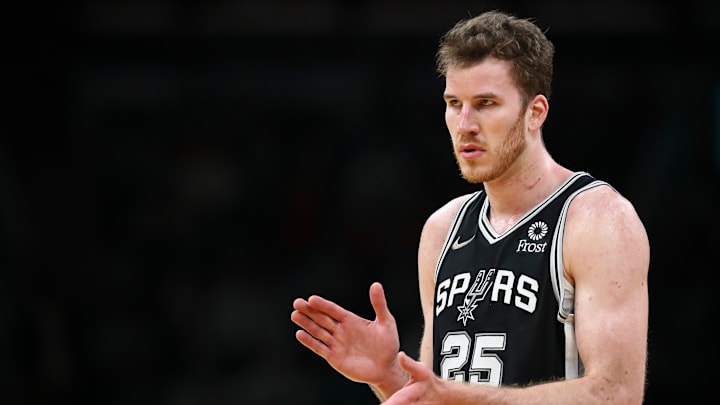In his first full season as a starter for the San Antonio Spurs, starting center Jakob Poeltl is having a career year. He’s averaging near a double-double this season but is playing fewer than 29 minutes per game. Part of the reason has to do with his free throw shooting, which is down to a career-low this season.
Although he's shown improvement lately, that glaring weakness in his game is one that can be a liability in late-game situations and is capable of being exploited by opponents. However, the Spurs can’t simply sit Poeltl in crunch time given how important he is to the team on both sides of the ball. With that in mind, let's examine how the Spurs should handle Poeltl in clutch situations.
It almost goes without saying that the easiest solution to the Poeltl situation would be for him to improve enough at the line for it to be less of an issue. That’s easier said than done, however, and will likely take time. In the meantime, the Spurs will have to figure out other ways to keep Poeltl’s foul free-throw shooting from becoming an issue in late-game situations.
Changes to the Rule in 2016 Help the Spurs
That said, the recent changes to the “hack-a-Shaq” rule have made his presence in close games much less of an issue than it otherwise might be. After all, teams can only intentionally foul a player off the ball up to the final two minutes of each quarter instead of each half, limiting the number of times opponents can hack Poeltl. With teams unable to intentionally foul in the final two minutes of games and the Spurs often down in those situations, it doesn’t always make sense for teams to employ the strategy.
Still, with Poeltl on the floor, late, poor foul shooting can continue to pose problems. For instance, his ability to grab offensive rebounds can be neutralized by teams fouling him, assuming they’re already in the penalty. They could simply wrap him up after he corrals the ball, forcing him to go to the line rather than having him kick the ball out for another possession or finish the play himself.
Additionally, he’s an excellent roll-man, and fouling him with the ball in his hands on the way to the basket makes sense. After all, putting Poeltl on the line, with barely a one in three chance of making one (let alone two) free throws puts the Spurs at a disadvantage.
Poeltl At Least Making One of Two is the Key
San Antonio scores 1.10 points per possession, which is around the league average. Therefore, he'd have to hit at least one free throw in those situations to avoid the team having an empty possession and for the Spurs to maintain that efficiency. It's a low bar, but if he can hit even just one free throw, then it negates the strategy.
If he can't, well then the Spurs will have to decide whether it's worth having him out there. Of course, that decision is made easier by the fact that the Spurs don't have another viable option to close games at center. Entering the season, it seemed as though Thaddeus Young could be an option given his versatility, as well as his ability to make his free throws.
That said, with Young out of the rotation and probably not long for the team, he isn't a realistic alternative at this point. The other option is Jock Landale, who's historically been a good 3-point shooter and has hit 20 of his 23 free throws this season. Despite that, he isn’t nearly the defender that Poeltl is and could get exploited defensively when guarding away from the basket.
What Poeltl Does on the Court Negates His Weakness
Without another option, San Antonio is forced to play Poeltl in clutch situations and hope for the best. There are going to be games where his free throw struggles are definitely an issue, as evident by the Spurs being 1-8 in games where he attempts at least five free throws.
On the other hand, Poeltl’s elite defense, rebounding, and ever-improving offense are likely why San Antonio is in so many close games, to begin with. Therefore it makes sense for them to ride out with Poeltl. Late in games, it also makes sense for Poeltl to have the ball in his hands less and play more off-ball.
Considering that he's one of the league's most effective screeners, he can still make a big impact by helping teammates get open. Moreover, in the final minute of games, the Spurs can try to use him as an in-bounder, much how they did with Tim Duncan. In doing so, they can keep Poeltl on the floor, utilize his passing ability, and prevent teams from fouling him in those circumstances.
Ultimately, the Spurs will have to live with Poeltl's free throw struggles. In most cases, his free throw shooting won’t be a big issue. However, if he's intentionally fouled, or fouled otherwise, then he’ll need to at least split the pair to keep the strategy from hurting the team.
If he doesn't, then the Spurs will have to live with the results. Poeltl, to his credit, is likely working hard to improve his biggest flaw but the results haven't been immediate. He may never become a good free-throw shooter, which could be an issue when the Spurs are a playoff team again.
That said, the Spurs' handling of Poeltl in clutch situations makes sense for the time being. But that may change if Poeltl doesn't eventually show significant improvement at the free-throw line.
